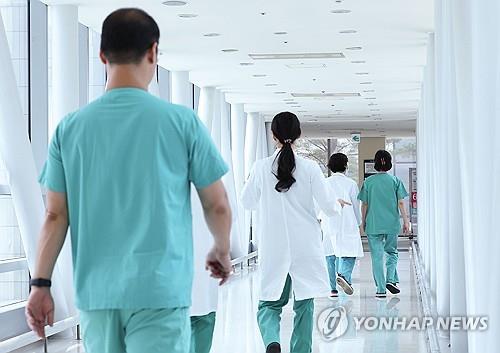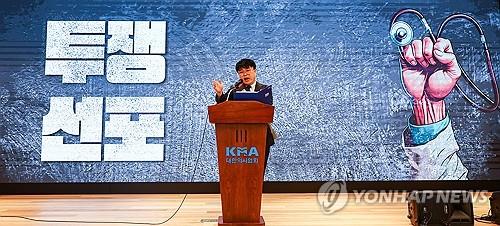- California Assembly OKs highest minimum wage in nation
- S. Korea unveils first graphic cigarette warnings
- US joins with South Korea, Japan in bid to deter North Korea
- LPGA golfer Chun In-gee finally back in action
- S. Korea won’t be top seed in final World Cup qualification round
- US men’s soccer misses 2nd straight Olympics
- US back on track in qualifying with 4-0 win over Guatemala
- High-intensity workout injuries spawn cottage industry
- CDC expands range of Zika mosquitoes into parts of Northeast
- Who knew? ‘The Walking Dead’ is helping families connect
More doctors decide not to join planned strike by community doctors next week
A growing number of doctors have decided not to join a planned strike by community doctors next week, according to the doctors’ groups Friday, saying that they would not put patients at more risk.
The move came as the Korea Medical Association (KMA), a major lobby group for community doctors, is scheduled to take a day off next Tuesday, in support of a protracted walkout by trainee doctors against the government’s medical reform.
Earlier in the day, a group of medical professors specializing in epilepsy announced their boycott of the planned strike.
“As the risk of physical damage and death increases significantly for patients suffering from epilepsy if their treatments are suspended, we can never cease the administration of medication,” the group said in a statement.
“Medical students and trainee doctors should immediately return, and medical organizations should face the government based on scientific grounds and analysis,” it added.

The Korea Obstetric Hospital Association and the Korea Children’s Hospital Association also announced their boycott of the walkout, stressing the importance of protecting critical patients.
“We understand the protest by the KMA, but we cannot leave patients behind,” the children’s hospital group, which includes 120 hospitals as members, said in a separate statement.
The Korean Society of Anesthesiologists also said essential staff will remain at hospitals to continue treatment.
Patients’ advocacy groups, meanwhile, welcomed a series of announcements expressing the boycott.
“We support and welcome the doctors’ decision that sustains their basic duties,” the Korea Severe Disease Association said in a statement, condemning the KMA for prioritizing its interests over people’s lives.
A union representing hospital workers also urged doctors to abandon their plan for a one-day walkout scheduled for next week.

“There is no cause or justification for the collective walkout of doctors,” the Korean Health and Medical Workers’ Union, which holds nurses and other related workers as members, said in a statement.
The union specifically criticized medical professors for joining the action instead of persuading junior doctors, who have left hospitals since February, to return.
Professors from the country’s 40 medical schools have recently decided to join the general strike, although it remains unclear how many of the senior doctors will actually participate in the walkout.
Medical professors at four major hospitals affiliated with Seoul National University have also warned of an indefinite walkout starting Monday.
“The medical community should engage in dialogue to save essential, regional and public medical services, and cooperate to normalize medical services instead of turning its back on the people,” the union added.
The KMA, meanwhile, announced the previous day that it may consider withdrawing the walkout if the government “shows a change in its stance.”
Despite fierce protests by trainee doctors, the government finalized an admissions quota hike of some 1,500 students for medical schools late last month, marking the first such increase in 27 years.
The government has also ordered community doctors to continue providing medical treatment and report to authorities if they close their practices on the day of the strike. It will issue another order for community doctors to return if more than 30 percent of them join the planned strike.
As of Friday, only 4 percent of the country’s 36,371 hospitals and clinics, or 1,463, reported that they will shut their doors next Tuesday, according to the health ministry.
The KMA earlier claimed that more than 90 percent of the participants showed support for a “strong protest” against the government’s decision during a poll among its members earlier this month.









![배우 김민희와 홍상수 감독[스타뉴스]](http://www.koreatimesus.com/wp-content/uploads/2025/04/20250408101705671-120x134.jpg)

